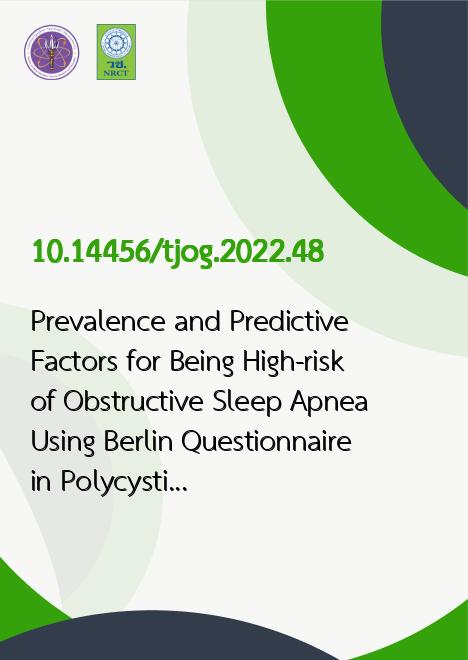
|
Prevalence and Predictive Factors for Being High-risk of Obstructive Sleep Apnea Using Berlin Questionnaire in Polycystic Ovary Syndrome: Age - and BMI-matched study |
|---|---|
| รหัสดีโอไอ | |
| Creator | Natnicha Kangwolkij |
| Title | Prevalence and Predictive Factors for Being High-risk of Obstructive Sleep Apnea Using Berlin Questionnaire in Polycystic Ovary Syndrome: Age - and BMI-matched study |
| Contributor | Areepan Sophonsritsuk, M.D., PhD**, Visasiri Tantrakul, Chuenkamon Charakorn, Siriluk Tantanavipas |
| Publisher | PIMDEE Co., Ltd. |
| Publication Year | 2565 |
| Journal Title | Thai Journal of Obstetrics and Gynaecology |
| Journal Vol. | 30 |
| Journal No. | 6 |
| Page no. | 413-422 |
| Keyword | obstructive sleep apnea syndrome, questionnaire, polycystic ovary syndrome, impaired fasting glucose |
| URL Website | https://tci-thaijo.org/index.php/tjog/index |
| Website title | www.tci-thaijo.org |
| ISSN | 2673-0871 |
| Abstract | Objectives: To evaluate prevalence and predictive factors for being high-risk of obstructive sleep apnea (OSA) in women with and without polycystic ovary syndrome (PCOS). Materials and Methods: This age and body mass index matched cross-sectional study recruited 94 women with ages between 20 and 40 years. Risk of OSA was assessed by Berlin questionnaire in 47 women with PCOS diagnosed by the Rotterdam criteria and 47 women without PCOS. Results: Women with PCOS had significantly greater waist circumference, waist-hip ratio, hyperandrogenism (HA), biochemical and clinical HA, and poorer metabolic parameters, that is, total cholesterol, low-density lipoprotein cholesterol and insulin, compared to women without PCOS. Women with PCOS revealed a statistically significantly higher prevalence in being high-risk of OSA than women without PCOS (27.7% vs 6.4%, p = 0.006). Impaired fasting glucose (IFG, fasting plasma glucose ? 100 mg/dL) was an independent predictor of high-risk for OSA using Berlin questionnaire with an odds ratio (95% confidence interval) of 29.19 (1.26-674.04).Conclusion: The prevalence of being high-risk of OSA assessed by Berlin questionnaire was higher in women with PCOS than those without PCOS. IFG but not PCOS was a significant key predictive factor associated with the development of being high-risk of OSA. Consequently, we suggested OSA risk screening using Berlin questionnaire should be assessed in women with PCOS. Polysomnography should be offered to the patients who either are being high-risk of OSA identified by questionnaire screening tool or having insulin resistance. |